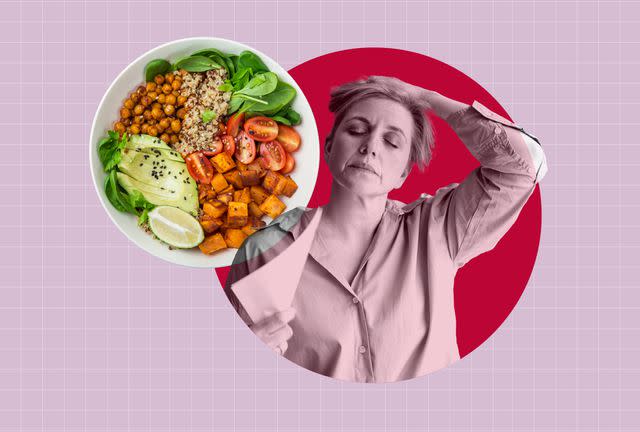New Research Shows a Vegan Diet May Reduce Hot Flashes by 95%—Here's What to Know
Adopting a plant-based diet may have game-changing benefits for postmenopausal women, according to a recent study.
Reviewed by Dietitian Jessica Ball, M.S., RD
A new study by researchers at the Physicians Committee for Responsible Medicine concluded that eating a vegan diet might be the key to finding relief from menopausal hot flashes. The study, to be published in the upcoming December 2023 edition of Complementary Therapies in Medicine, suggests a connection between a low-fat, vegan diet enriched with cooked soybeans and a staggering 95% reduction in the frequency of hot flashes.
The study was conducted on postmenopausal women experiencing at least two moderate-to-severe hot flashes daily. Their results suggest a direct correlation between dietary choices and the alleviation of vasomotor symptoms such as hot flashes and night sweats. These findings carry significant implications for postmenopausal women, considering other research indicates that 85% experience hot flashes. Additionally, previous studies have found that those who experience hot flashes have an increased risk of developing chronic conditions like heart disease. Read on to learn more about the study’s findings and how adopting a vegan diet may help give you respite from unpleasant symptoms.

Design elements: Getty Images. Collage: Cassie Basford.
What the Study Found
Over 12 weeks, some of the study’s participants—a subset of 11 postmenopausal women of the 84 total enrolled in the study—meticulously recorded the frequency and severity of hot flashes through a dedicated mobile application. The results were astounding, indicating a 95% decrease in total hot flashes, with severe hot flashes disappearing entirely and a 96% reduction in moderate-to-severe hot flashes.
The study also explored the role of the gut microbiome in mediating these effects. The research team asked the participants to provide stool samples at the beginning and end of the 12-week period for a gut microbiome analysis. Then, deep shotgun metagenomic sequencing was used to assess changes in the gut microbiome at baseline and after the 12-week dietary intervention. These findings revealed significant associations between alterations in gut bacteria and the reduction in severe day and night hot flashes.
Hana Kahleova, MD, Ph.D., lead study author and the director of clinical research at the Physicians Committee for Responsible Medicine, hypothesized this could be related to a vegan diet avoiding foods like meat and dairy that are high in saturated fat and compounds called advanced glycation end-products, both of which can lead to inflammation that may contribute to hot flashes.
While the study doesn't suggest a one-size-fits-all solution, it highlights the potential benefits of a well-balanced, plant-focused diet in helping manage menopause symptoms. The anti-inflammatory and hormone-balancing properties associated with vegan diets may help alleviate these symptoms. However, the researchers caution that individual responses vary, and dietary choices should be personalized based on individual health needs.
The Bottom Line
A recent study led by researchers from the Physicians Committee for Responsible Medicine revealed that adopting a low-fat, vegan diet enriched with soybeans reduced hot flashes frequency by 95% in postmenopausal women. While individual responses vary, this dietary approach may be a natural way to provide relief from common vasomotor symptoms of menopause. As always, speak with a healthcare professional or registered dietitian before changing your eating pattern to help ensure your food choices align with your personal health needs.
Read Next: Menopause Diet: 5 Foods to Help Relieve Your Symptoms
Read the original article on Eating Well.

